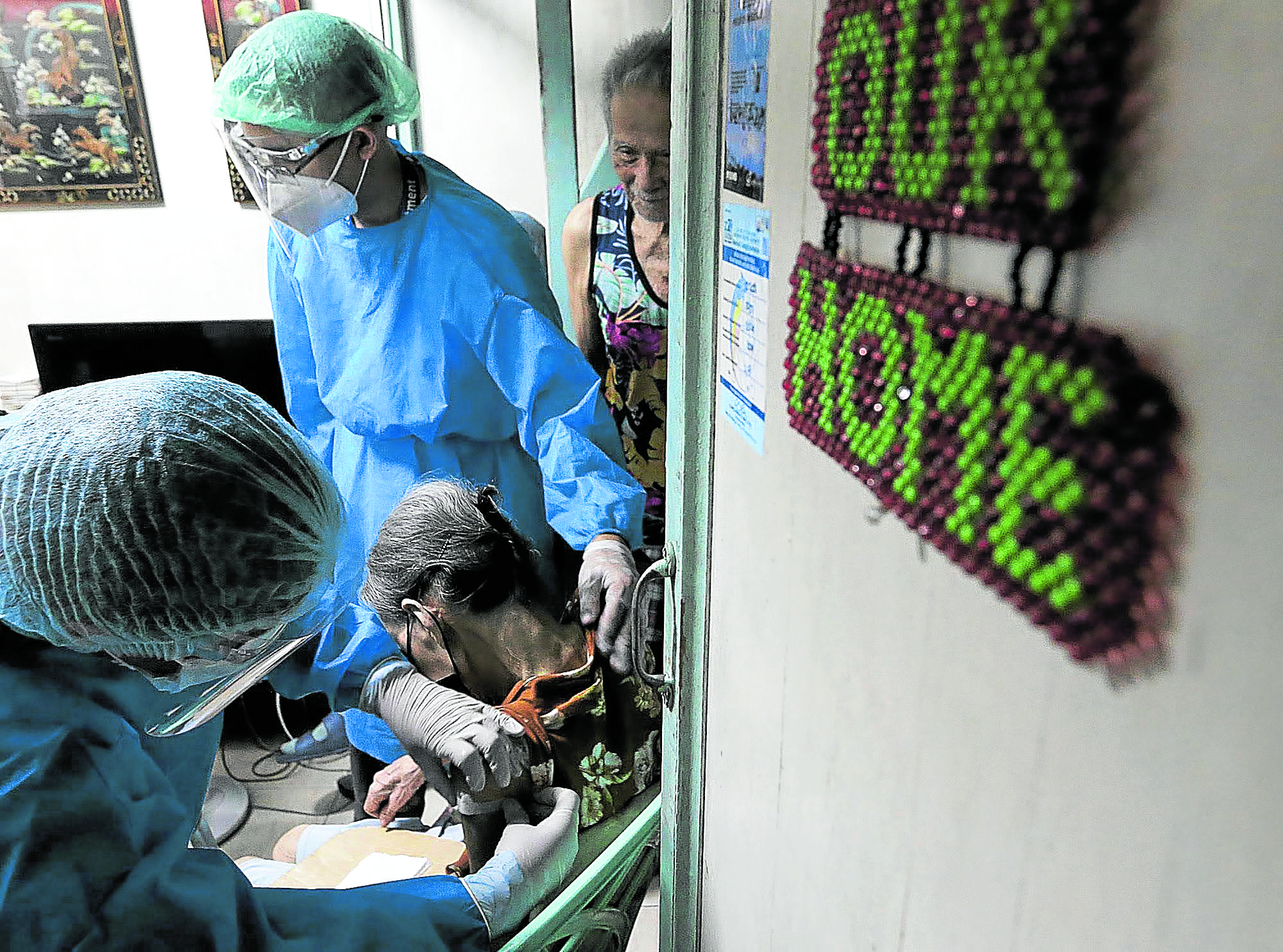Home vaccination for seniors pushed; 11% got jabs so far

Resident Soledad Ablaza, 89, receives the 2nd dose of Sinovac vaccine from health workers of Manila Health Department during home vaccination for bedridden citizens of the local government of Manila in Barangay 221, Tondo. INQUIRER PHOTO / RICHARD A. REYES
MANILA, Philippines — Health workers should just visit and inoculate senior citizens at their own homes if they are too frail or hesitant to go to COVID-19 vaccination centers.
Presidential spokesperson Harry Roque on Thursday said he would recommend the house-to-house vaccination of bedridden seniors at the meeting of the Inter-Agency Task Force for the Management of Emerging Infectious Diseases (IATF).
“I’m going to suggest that the (local governments) somehow exert effort to determine if the seniors… are not being inoculated because they are physically unable to leave their rooms, in which case we should come up with a system now,” Roque said in a television interview.
Vaccine czar Secretary Carlito Galvez Jr. said he and Health Secretary Francisco Duque III requested President Rodrigo Duterte in a meeting on Wednesday to directly encourage the people, especially seniors, to get inoculated, especially now when the government is struggling to convince more Filipinos to get their shots.
Galvez said an appeal coming from Duterte himself would be helpful “because the people listen to you.”
Article continues after this advertisement“We really need to convince them to have the courage to get vaccinated. It would count a lot if you will announce, Mr. President, that senior citizens must really take their vaccines because as of now only 11 percent [of them] have been vaccinated. And from the list of our casualties, we see that more than 60 percent of those who died from COVID-19 are seniors,” Galvez said.
Article continues after this advertisementThere are 9.4 million senior citizens in the A2 priority group for vaccination.
Narrow window
Some cities in Metro Manila have already been administering COVID-19 vaccines at home, such as Manila, Taguig, Pasay, and Muntinlupa.
In Manila, public information officer Julius Leonen said 703 bed-ridden seniors had been given their first dose of either Sinovac or AstraZeneca.
“The one that is difficult to carry [door-to-door] is the Sputnik V [as it] requires a lower temperature,” Leonen said.
Health systems specialist Dr. Albert Domingo said such a strategy for the benefit of the elderlies “can and should be done.”
“The vaccines have a window of a few hours that allows them to be brought to a certain temperature, (like) in a portable icebox, without (them) losing efficacy,” Domingo said in a separate interview.
“The key is to pre-identify these individuals [for home vaccination by] using tools like ‘spot maps,’” he said, referring to a common epidemiologic tool for plotting illness, geography, and other data of a certain population.
Domingo said it may even boost the overall vaccine rollout across economic sectors, if other household members see that their elders are being vaccinated.
For Dr. Tony Leachon, a former adviser to the IATF, home vaccination is something “we should not discourage… but there must be a blueprint for this group of special population.”
Galvez also said the Department of the Interior and Local Government (DILG) and local governments should intensify their efforts to increase people’s vaccine confidence as well as public uptake.
He noted that some cities or municipalities were having a hard time convincing people to get the shot, particularly those from D and E economic groups.
There is higher vaccine uptake, however, in groups A, B, and C, he added.
“We are having difficulty in the innermost sectors of congested areas because more or less 40 percent [of the people] there do not want to get vaccinated,” Galvez said.
To address vaccine hesitancy, Galvez said, the government is conducting town hall meetings with the Department of Health (DOH) with the help of the private sector.
Duterte: Don’t be choosy
The President has admonished local governments that reportedly expressed preferences for specific COVID-19 vaccines brands, particularly for US-made Pfizer shot. He said being selective about vaccines at this point was not feasible because of the shortage in global supply.
According to Duterte, allowing some localities to administer just a single brand of vaccine would agitate other local governments into making a similar demand.
“I cannot administer Pfizer exclusively in one place to the exclusion of other Filipinos. That cannot be allowed. [The allotments] should be mixed and people should be ‘blind’ as to what brand is given. What is important is that there is a vaccine [for them],” he said.
The President maintained the currently available COVID-19 vaccine brands do not vary in efficacy. “Vaccine is vaccine, there is no need to be selective. And the best vaccine is really the one that’s available for you,” he said.
For more news about the novel coronavirus click here.
What you need to know about Coronavirus.
For more information on COVID-19, call the DOH Hotline: (02) 86517800 local 1149/1150.
The Inquirer Foundation supports our healthcare frontliners and is still accepting cash donations to be deposited at Banco de Oro (BDO) current account #007960018860 or donate through PayMaya using this link.